Outwardly at least, I present the image of a cultural connoisseur with finely honed tastes. I tend to pick the arthouse film over the Hollywood blockbuster. The hole-in-the-wall over the cookie-cutter chain restaurant. But, like pretty much everyone else on the planet, I also have my fair share of guilty pleasures. The sweet '90s jams of Mariah Carey hold a special place on my playlist, as does the earnest crooning of '70s rock band Styx. (Domo arigato, Mr. Roboto.) I eat way too much candy for a full-grown adult. And I'm mortally embarrassed to admit that I spent my Sunday this week giddily watching WrestleMania, WWE's annual pay-per-view extravaganza that has become a de facto national holiday for those of us who enjoy watching men and women in neon spandex pretend-fight for our amusement.
With all that off my chest, I hope those reading this feel a little bit better about their own guilty pleasures. But let's take a moment to examine exactly why it is we feel so bad about liking the things that bring us joy. The simple answer is that, deep down, we don't actually feel that bad at all. The supposed guilt we experience after watching a brainless movie or binging on trashy reality TV stems not from personal shame, but from a looming fear that our friends, family and society at large will judge us for our cultural predilections.
Because we never miss an opportunity to define the world through the tiny boxes we love placing everything in, society has, over time, decreed the films, music and food that is worth our time, and those that are not. It's the same mentality that distinguishes between so-called high and low art, that (mostly) keeps graffiti from gracing the walls of pricey galleries, that keeps In-N-Out from earning a Michelin star (Travesty!), and that keeps a pulse-pounding horror film from winning Best Picture at the Oscars. (Although Silence of the Lambs did take home that honour in 1992, the lone exception proving the rule.)
For the vast majority of us, the list of favourite flicks or beloved bands we share with the world reflects our idealized self, the version of ourselves we would become if only we had the time and inclination. I think most of us would like to be seen as the kind of person who reads James Joyce, but there are scant fewer of us who would actually sit down and slog through all 730 pages of Ulysses.
Wouldn't we feel better if we admitted openly that some of our preferences are less sophisticated than others? Why do we insist on jamming a round peg into a square hole, just for some imaginary audience we've conjured in our minds? Besides, the internet, for all its horrible traits, has fostered the kind of subcultures that makes our guiltiest pleasures easier to appreciate. In 2018, so-called nerd culture is no longer maligned, but championed, and it's become easier than ever to find a tribe online that shares your particular affinity.
As counter-intuitive as it may seem, perhaps there's another less-obvious reason why we play the shame game. After watching a colleague scarf down a chocolate bar with equal parts joy and embarassment, Yale University Professor Rhavi Dhar launched a series of experiments investigating the "unlikely entanglement" of pleasure and guilt. What he found? A little guilt can go a long way towards enhancing the things we already love.
"For certain types of items, when you feel guilty, you may actually get more pleasure," said Dhar, describing how tightly packed the concepts of pleasure and guilt are in our minds, drawing out one by activating the other.
It's a simple yet powerful insight for those of us who still struggle with bringing their guilty pleasures out from the shadows. Let's just not tell the marketers.




